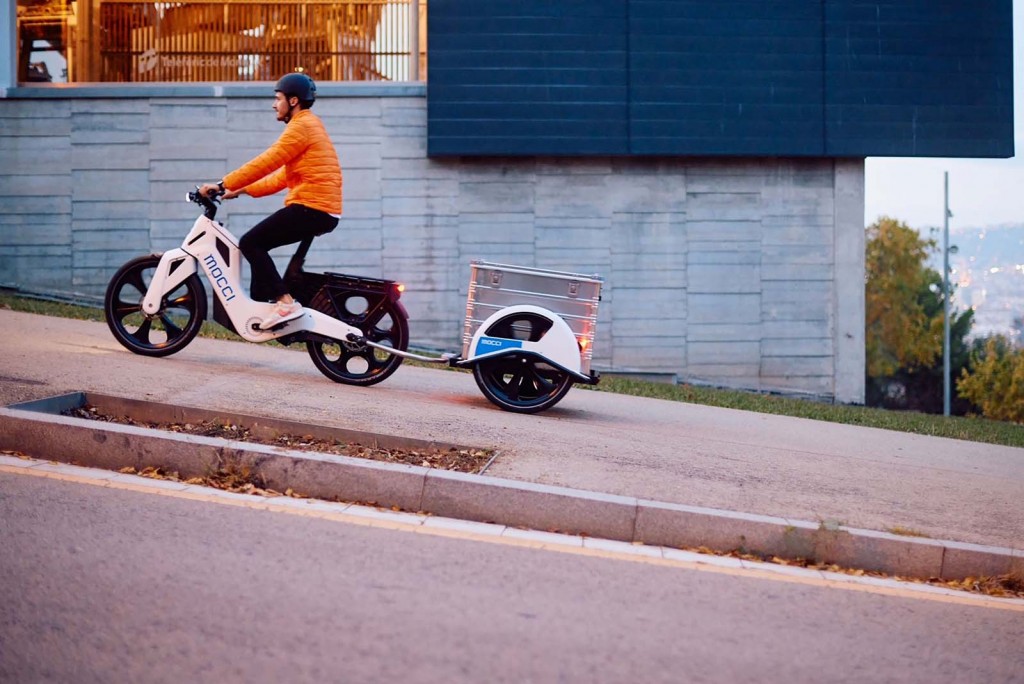
Tired of having to fiddle about and clean the chain on your electric bike? Well, you might not have to: two German firms have teamed up to develop the first chainless drive system for e-bikes.
The new system is called Free Drive, and has been developed by engineering giant Schaeffler and bike drivetrain specialist Heinzmann. Focused particularly on cargo e-bkes, the system was first shown in concept form in late 2021, and series production has now started.

So how exactly does a bike work if there isn’t a chain linking the pedals and the rear wheel? It’s all down two an electronic pedal-by-wire system, replacing the physical link with digital technology.
The ‘hybrid’ Free Drive system consists of a pedal generator, a drive motor, a battery and a human machine interface (HMI). The key component here is the Schaeffler-developed pedal generator. Instead of turning a cog that winds a chain, turning the pedals produces resistance that it used to provide electricity to the motor in the rear-wheel hub.
The motor can deliver a total output of 250 watts – that’s the same as the maximum power allowed on UK-standard pedal assist e-bikes – and any surplus electrical energy generated by furious fast pedalling is used to charge up the bike’s battery.
Because of the lack of a physical connection, the firms claim that turning the pedals requires less muscle power than a conventional e-bike drivetrain, which is particularly useful for cargo e-bike riders tackling long journeys with heavy loads.

To be clear, this isn’t like some of the wild high-powered e-bikes available outside the UK that feature motorbike-style throttles: the hybrid system still uses pedal power to drive the wheels. The difference is that the power you generate is sent to the wheels as electricity through a wire rather than on a chain. That’s significant, because it means the machine should still meet UK e-bike rules.
Heinzmann is responsible for selling the complete Free Drive unit to bike firms and fleet operators, while Schaeffler is contributing the pedal generator.
The two firms claim that one key benefit of the Free Drive system is that it, because it doesn’t need a chain, belt, gear rings or sprockets, it is less prone to mechanical wear than a conventional system. It also allows for gear shifts and different drive modes to be controlled by software.
The system has bigger potential, too: the design of conventional e-bikes is dictated by the need for the mechanical connection between the pedals and the motor, so a pedal-by-wire system opens up considerable design freedom.
Jochen Schröder, the head of Schaeffler’s e-mobility division, said the system “opens up completely new possibilities in bike architecture and pedal configuration – including designs with two, three or four wheels, with or without a roof.”

The first customer for the Free Drive system is German firm CIP Mobility, which is installing them on its new Mocci Smart Pedal Vehicles, a cargo e-bike designed to tackle urban deliveries.
The Mocci features an integrated software system that allows the ride to be customised to the needs of each firm and rider, while its key structural components are made from recyclable high-performance plastic, which the firm claims creates 68 per cent fewer CO2 emissions to produce than an aluminium frame.
Schaeffler and Heinzmann are looking for further customers for the Free Drive system, with plans to steadily increase capacity in the coming years.
READ MORE
Subscribe to the Move Electric newsletter
e-CARS
Ten electric cars we're excited for in 2023
Getting an EV sideways: how easy is it to drift a Kia EV6 GT?
Q&A: Jaguar Racing's Sam Bird and Mitch Evans on Formula E's new era
e-BIKES
Ten electric bikes we're excited for in 2023
Can you get fit using an electric bike?
e-MOTORBIKES
Ten electric motorbikes we're excited for in 2023
Super Soco TC Max electric motorbike review
Cake and Polestar team up for new special edition Makka e-motorbike
e-SCOOTERS
Planned laws to legalise private e-scooters face delay
Five key takeaways from the rental e-scooter trials report
Which train firms have banned e-scooters from their services?
e-WORLD
Move Electric's best features of 2022: lap records, tuk-tuks… and sausage rolls
Volvo Trucks keeps on electric trucking with three new models
